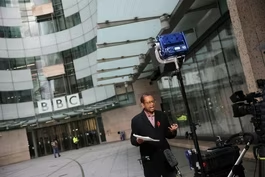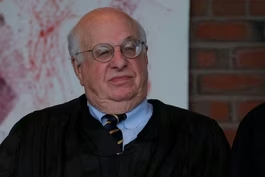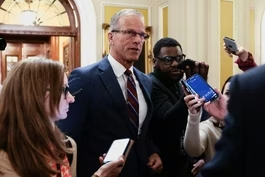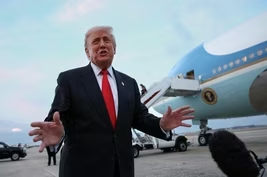
How UCLA is navigating Trump's unprecedented demands
Clip: 11/11/2025 | 8m 55sVideo has Closed Captions
How UCLA is navigating unprecedented demands from the Trump administration
The Trump Administration has tried to reshape higher education by cutting off funding and issuing executive orders on a variety of issues, including diversity, trans rights and antisemitism. While some universities reached settlements, others are navigating a new school year in the federal government’s crosshairs. That includes UCLA, where Stephanie Sy reports for our series, Rethinking College.
Problems playing video? | Closed Captioning Feedback
Problems playing video? | Closed Captioning Feedback
Major corporate funding for the PBS News Hour is provided by BDO, BNSF, Consumer Cellular, American Cruise Lines, and Raymond James. Funding for the PBS NewsHour Weekend is provided by...

How UCLA is navigating Trump's unprecedented demands
Clip: 11/11/2025 | 8m 55sVideo has Closed Captions
The Trump Administration has tried to reshape higher education by cutting off funding and issuing executive orders on a variety of issues, including diversity, trans rights and antisemitism. While some universities reached settlements, others are navigating a new school year in the federal government’s crosshairs. That includes UCLA, where Stephanie Sy reports for our series, Rethinking College.
Problems playing video? | Closed Captioning Feedback
How to Watch PBS News Hour
PBS News Hour is available to stream on pbs.org and the free PBS App, available on iPhone, Apple TV, Android TV, Android smartphones, Amazon Fire TV, Amazon Fire Tablet, Roku, Samsung Smart TV, and Vizio.
Providing Support for PBS.org
Learn Moreabout PBS online sponsorshipGEOFF BENNETT: Since taking office in January, the Trump administration has moved to reshape higher education, cutting off funding, and issuing a series of executive orders targeting diversity programs, transgender rights, and how universities handle investigations into antisemitism.
While some schools have reached settlements with the administration, others are navigating the academic year squarely in the federal government's crosshairs, including the University of California, Los Angeles, where Stephanie Sy reports for our series Rethinking College.
AMY THAN, Graduate Student, UCLA: Students can work in any department within the UCLA system.
STEPHANIE SY: During the first days of the fall quarter, undergraduates, including many freshmen, get advice on applying to join one of the hundreds of research labs at the University of California, Los Angeles.
AMY THAN: When you reach out to faculty, CC their grad students and their lab managers.
STEPHANIE SY: Amy Than is a Ph.D.
student and mentor with the Undergraduate Research Center at UCLA.
AMY THAN: You can see from the students that leave these talks, they're so enthusiastic.
It's like everything is in flux, I think.
That's the vibe, in flux.
STEPHANIE SY: The Trump administration's freezing of nearly $600 million in federal grants has cast a cloud of uncertainty over one of the nation's most prestigious public research universities.
The penalty for what the administration says was a hostile environment for Jewish and Israeli students was announced over the summer.
DONALD TRUMP, President of the United States: Some of these schools are getting billions and billions of dollars, and they misbehave, so that's it.
And, so one way or the other, we're going to win that whole thing.
STEPHANIE SY: Now, funding disruptions could trickle down at UCLA, including to many of the 4,000 undergrads involved in research labs here.
LINDSEY YOUNG, Undergraduate Student, UCLA: UCLA is such a big campus and I believe it's really important to the state of California.
Hopefully, it's not too impacted.
JAIVIN PHABIANI, Undergraduate Student, UCLA: It's a little concerning about whether labs are going to take as many students as they were before.
DANNY NGUYEN, Undergraduate Student, UCLA: We're being punished for things that aren't related to science.
STEPHANIE SY: Danny Nguyen is a fourth-year undergrad who works in a lab studying the way emotions influence memory.
Does it worry you that there may be fewer positions and fewer opportunities if these grant cuts are to go through?
DANNY NGUYEN: Yes, the importance of having lucrative grants is that we're able to subsidize our Ph.D.
students, our graduate students, but also to train the next wave of graduate students at the undergraduate level.
STEPHANIE SY: In September, a federal judge ordered the Trump administration to unfreeze most of the suspended grants, but with litigation ongoing and federal officials demanding more than $1 billion, university leaders say they're facing one of the gravest threats ever to the U.C.
system.
DAVID MYERS, Professor, UCLA: We are being faced with what I can only think of as a kind of mafia-style shakedown of $1.2 billion.
STEPHANIE SY: David Myers is a professor of Jewish history at UCLA.
In August, he co-authored an open letter on behalf of many Jews at the university, calling the administration's demands misguided and punitive.
DAVID MYERS: I think there's actually a very wide consensus in the Jewish community the notion that stripping UCLA of research funding in the medical and health fields will in some way help with the struggle against antisemitism is delusional.
STEPHANIE SY: In the wake of large and sometimes violent confrontations in the spring of 2024, the university created new guidelines on protests and established an initiative to combat antisemitism.
And, in July, it settled a lawsuit with Jewish students and a professor who argued protesters violated their civil rights.
If this, as you call it, mafia-style shakedown succeeds, what will it mean for this institution, for academia, for this country?
DAVID MYERS: I think it will mean the end of the golden age of higher education in the United States.
Universities and colleges have been gateways of opportunity for so many people.
So I think it is an extremely ominous moment.
STEPHANIE SY: The moment is reverberating among students on campus.
MALEEYAH FRAZIER, Undergraduate Student, UCLA: From my freshman year to when Trump was elected, I think a lot of us kind of walked around, like, hesitant.
Like, we don't know where we stand in higher education.
It's just very scary times.
STEPHANIE SY: Maleeyah Frazier is chairperson of the African Students Union at UCLA.
She sees the attack on science funding as just one part of a broader shift in higher ed policy, including Trump's termination of diversity, equity and inclusion initiatives.
MALEEYAH FRAZIER: I kind of worry that students that look like me kind of won't be -- won't feel like they deserve or really know what higher education is or know that they can also go to college or they belong in universities too.
STEPHANIE SY: At UCLA, Maleeyah says the school is scrutinizing long-running peer counseling programs for marginalized communities.
DONALD TRUMP: I ended all of the lawless so-called diversity, equity and inclusion bull (EXPLETIVE DELETED).
(CHEERING) STEPHANIE SY: More than 400 college campuses in 47 states have already made reforms, from closing DEI offices and student centers to ending or revising criteria for race-based scholarships.
The Trump administration has also intensified investigations under Title VI of the Civil Rights Act, alleging failure to combat antisemitism and claiming diversity initiatives are discriminatory.
Linda McMahon is the secretary of education.
LINDA MCMAHON, U.S.
Education Secretary: Our goal is really not to be punitive necessarily, but to have universities, I think return to what we all believe that universities really started out to being.
And that was it is a place for truth seekers.
It is a place for open debate, sharing of ideas of truth.
DAVID GONZALEZ, Assistant Project Scientist, UCLA: My hours got cut.
Salary got cut in half.
STEPHANIE SY: David Gonzalez studies the health effects of pollution and wildfire smoke in a lab at UCLA.
In April, his National Institutes of Health grant was canceled in a purge of diversity-focused initiatives.
That grant was restored in a court case, only to be frozen again in the broader cuts announced this summer and restored again by a judge.
DAVID GONZALEZ: Got the "Sorry to inform you, you don't have this anymore" message twice.
STEPHANIE SY: Gonzalez graduated from undergrad, completed his Ph.D.
and his postdoc at UCLA.
He worries that those opportunities may be closing for those coming behind him.
DAVID GONZALEZ: I didn't really come from a family where I knew what a Ph.D.
route was, right?
And what was great about UCLA is, there was a lot of faculty here that would encourage, hey, as an undergrad, these are things you can do.
You can do research.
I think that the availability of more senior researchers like graduate students and postdocs to take on undergrads and mentor them is what's going to suffer.
And that is kind of a linchpin in that process.
STEPHANIE SY: Second-year student Jayha Buhs Jackson worries about the university's future.
JAYHA BUHS JACKSON, Undergraduate Student, UCLA: You can look inward and you can see like this is any other college campus.
We have kids walking around, getting classes, getting their coffee.
But I think internally there's a lot dropping with, what is the university going to look like a couple months from now?
STEPHANIE SY: Jayha signed a letter with other student leaders across the state urging U.C.
officials not to cut a deal with the administration.
Trump's demands include not only $1 billion in fines, but assurances that UCLA will not admit foreign students who are likely to be -- quote -- "anti-Western," allow an outside monitor and ban transgender students from women's sports.
JAYHA BUHS JACKSON: UCLA needs to have -- retain their backbone and not settle at all.
STEPHANIE SY: For history professor David Myers, the notion that science is a public good is at stake and, he worries, maybe even more.
DAVID MYERS: How far off is the day when someone will be reviewing my syllabus and telling me, this reading is permitted, that's not?
When I thought of it over the last couple weeks, it did not seem to be a distant fantasy.
It seemed like that could be realized in the next two or three years, especially if a settlement is struck.
STEPHANIE SY: Others have already settled.
And what the University of California does or does not agree to could have impacts far beyond UCLA's campus.
For the "PBS News Hour," I'm Stephanie Sy in Los Angeles.
BBC under scrutiny over edit of Trump's speech on Jan. 6
Video has Closed Captions
Clip: 11/11/2025 | 7m 13s | BBC under scrutiny over edit of Trump's speech on Jan. 6 (7m 13s)
Book explores Edmund Fitzgerald wreck and legend it inspired
Video has Closed Captions
Clip: 11/11/2025 | 8m 42s | 'The Gales of November' explores the Edmund Fitzgerald tragedy and the legend it inspired (8m 42s)
Conservative judge resigns, calling Trump uniquely dangerous
Video has Closed Captions
Clip: 11/11/2025 | 8m 31s | Prominent conservative judge resigns, calling Trump 'uniquely dangerous' (8m 31s)
Inside the deal to end the government shutdown
Video has Closed Captions
Clip: 11/11/2025 | 4m 31s | Breaking down the deal to reopen the government and what comes next (4m 31s)
Trump floats tariff 'dividends,' but experts doubt the math
Video has Closed Captions
Clip: 11/11/2025 | 7m 10s | Trump floats tariff 'dividends' for Americans, but experts question the math (7m 10s)
Providing Support for PBS.org
Learn Moreabout PBS online sponsorship
- News and Public Affairs

FRONTLINE is investigative journalism that questions, explains and changes our world.

- News and Public Affairs

Amanpour and Company features conversations with leaders and decision makers.












Support for PBS provided by:
Major corporate funding for the PBS News Hour is provided by BDO, BNSF, Consumer Cellular, American Cruise Lines, and Raymond James. Funding for the PBS NewsHour Weekend is provided by...





